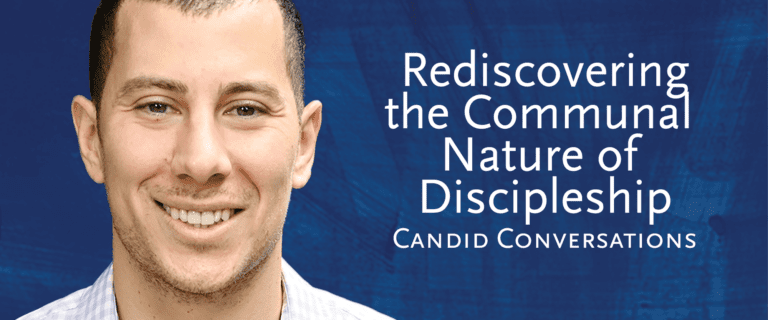Have we in the West forgotten the purpose and importance of the church? Special guest Thomas Tarrants, President Emeritus of the C. S. Lewis Institute, and Jonathan discuss why people are failing to return to church, the fundamental characteristics of the early church, and the key to rejoining together as God’s people to bear good fruit both individually and collectively.
This conversation is condensed and adapted from episode 210 of Candid Conversations with Jonathan Youssef. Listen today on your favorite podcast platform or online to hear Thomas’ full episode.
From the time we step forward to receive Jesus and follow Him, we’re stepping away from the devil and his kingdom.
Jonathan: As you know, when COVID came through, we were all forced to do virtual church, and now it seems that few people are returning to church. They didn’t feel like they needed that in-person fellowship; rather, they could just watch online or attend with far less regularity. What do you think led up to this scenario?
Thomas: The concept of the church is seriously lacking in the lives of many people. [The situation] hasn’t been helped by the lack of teaching on the church—what it is and [how to understand it]. People think, "Well, Sunday I need to go to church, and I check that box." People [often] come to be entertained or to fulfill some kind of religious obligation they feel.
What’s helpful is to recapture a Biblical understanding of the church, and that takes us back to the Gospels and the book of Acts and the epistles. In those days, the church was actually not an institution, and it absolutely was not a building. Jesus pulled together twelve men and formed them into a community. And in that community, He taught them, mentored them, trained them, sent them out on mission, and debriefed with them afterwards. And it was a corporate thing. It wasn’t all one on one, which we tend to gravitate toward because our culture is so oriented to individualism and independence in America. Those aren’t bad things, but the question is the degree. And so, it’s easy to think of faith in Christ as being me and Jesus. Of course, that’s true, but it doesn’t stop there. That’s the beginning, that’s the foundation of everything.
Jonathan: It’s incomplete, right?
Thomas: It absolutely is incomplete, and it’s not what God intended. Your Christian life will absolutely not flourish if you are not in the kind of relational matrix that God has intended. He designed all of this. Church is His idea; it’s not man’s idea.
You can sympathize with some folks who have seen some negative things in organized religion. But they need to be helped to see that there’s something more here. In the book of Acts, Jesus poured out the Holy Spirit on this group of praying disciples, and they were empowered. Peter, who had just denied Jesus a few weeks earlier, preaches to some of the same people that had crucified Jesus. And 3,000 people are converted.
What do they do? In Acts 2:42, "They devoted themselves to the apostles’ teaching, to the fellowship, to the breaking of bread and the prayers." That Greek word underlying "devoted" means that they gave themselves really zealously and steadfastly. They devoted themselves to these four practices: the teaching.
And then the fellowship—koinonia, which is a word that conveys the idea of sharing your life and who you are and what you have with others. Nowadays, it’s often thought of as coffee and donuts between services. And that’s good. But it doesn’t even begin to touch on what this means. In the rest of the chapter, it talks about how they were selling their possessions and distributing the proceeds to all as any had need. It means a lot more than we realize.
And then the breaking of bread. That wasn’t simply having a meal together, which they did, but in the earliest days, communion was part of a meal. Those became separated in time, but the idea here is a close connection with people sharing in very deep and sacred things: the Lord’s Supper and then sharing a meal with people you’re close to.
Then the prayers. Prayer is getting together and really praying and interceding, not as a lone ranger but with a group of other people.
When you have a group [with 10 to 12 people] that you meet with regularly (and they met weekly and more often but [at least] weekly), you begin to form some close relationships. And that is part of the whole process of growing as a disciple. You learn in community. As Paul elaborates in 1 Corinthians 12, the Holy Spirit distributes gifts to people according to what He knows to be the need in a given congregation so that people are able to serve one another.
Jonathan: Because we’re such a hyper-individualistic culture, it’s easy for churches to get caught up in and replicate what the culture promotes, and we end up missing out on the beauty and the design of what church is intended to be.
Thomas: I certainly agree with you, Jonathan. It’s the same old thing: the world, the flesh, and the devil. We are in a cosmic conflict. From the time we step forward to receive Jesus and follow Him, we’re stepping away from the devil and his kingdom, and he wages a campaign to try to recover us. John says don’t love the world or the things in the world (see 1 John 2:15-17). Paul [exhorts], "Don’t be conformed to this world, but be transformed by the renewal of your minds" (see Romans 12:2). And so things [like] iPads or cell phones and a world of other things, especially in America—materialism—things of the flesh, of the world, appeal to our fleshly interests. We have to take a stand against those things and allow ourselves to be transformed by the Holy Spirit and empowered by the Spirit to reject what’s evil and cling to what’s good. But you don’t hear a lot of teaching about this either.
The key to this is being filled with the Holy Spirit. In Ephesians 5:18, Paul says, "Don’t be drunk with wine, which is debauchery, but be filled with the Spirit." That verb [be filled] means to be continuously filled. It’s a command. Same in Romans 6. It’s that wholehearted surrender to the Lord that’s crucial to be filled with the Spirit and have the empowering that we need to resist [daily] temptations and to walk in the Spirit, bear the fruit of the Spirit, and serve the Lord and accomplish what purposes He has for our lives.
Jonathan: Even in Romans 6, Paul’s using the plural there. "You all were dead with Christ and raised to new life with Him, baptized with Him." You don’t do this in isolation, as an individual. You actually do this with the people that He’s put with you. Well, I know you’ve been doing some work and research on discipleship. Is there anything you want to share with us?
Thomas: Our relationship with the Lord is so shallow [in the West]. So many of us have been in a perpetual infancy. You can be a spiritual infant and be 60 or 70 years old. You can be a spiritual infant and know a lot of Bible verses, too. It’s not simply understanding and remembering Bible verses or theology on a cognitive level. We are called to something more. We are called to really know God experientially, personally. It’s a relationship, and we’re called to love God with all our heart, mind, soul, and strength and to love our neighbors as ourselves.
Jonathan: Yes, when the wind’s in your face, what are you going to hold onto? A lot of those other things will blow away. You’ve got to grab hold of Christ.
This conversation is condensed and adapted from episode 210 of Candid Conversations with Jonathan Youssef.
Share
Recent MY Journal

How Do We Stop Scrolling Ourselves to Death? (Candid Ep. 298)
January 2, 2026

Dr. Youssef Announces Extraordinary New Season of Ministry
January 1, 2026
Sign Up for Ministry Updates
You might also like

Spiritual Growth
4 Signs You’ve Found a Bible-Believing Church
August 8, 2024
Spiritual Growth
Breaking the Idol of Entertainment
December 1, 2023



